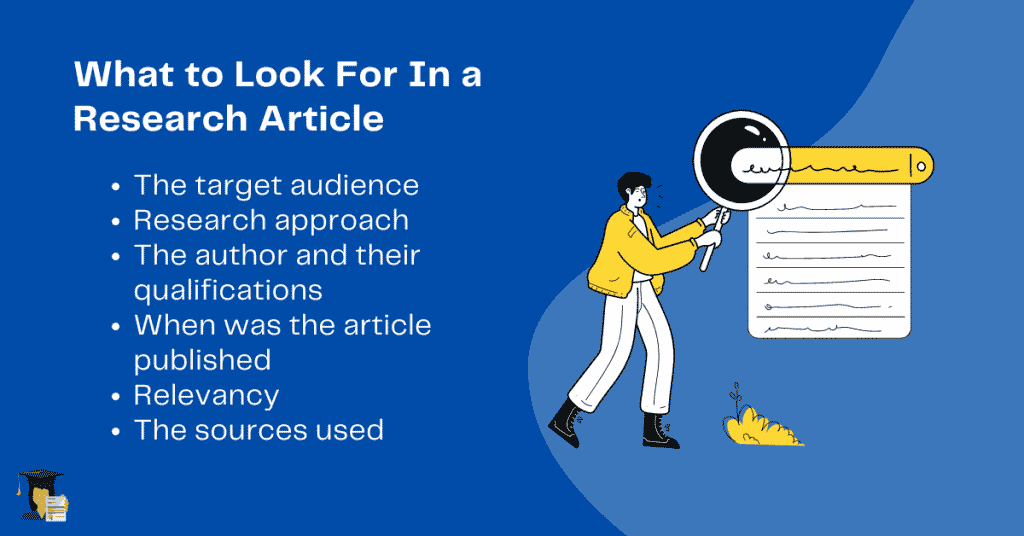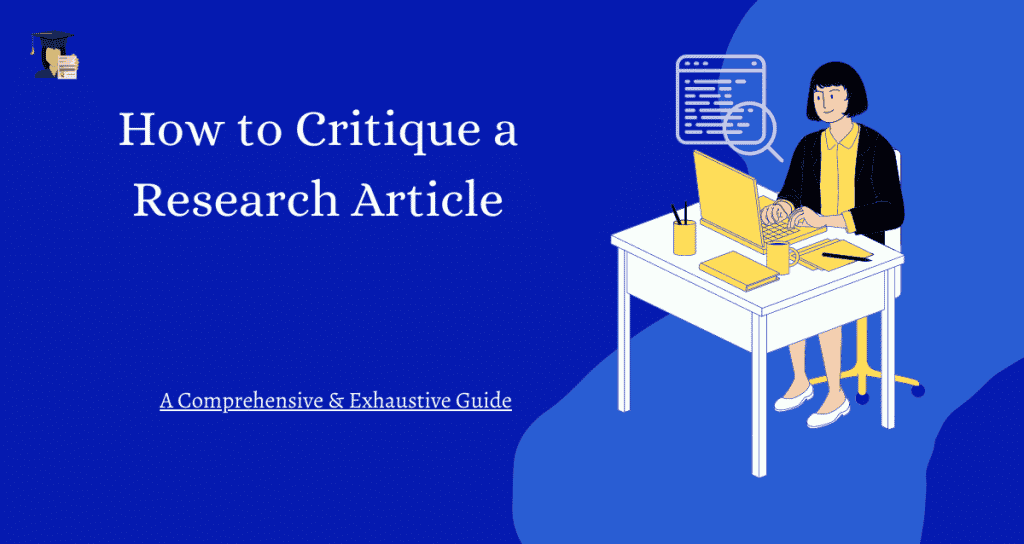If you are here, it means you have been tasked with writing a research article critique. Are you wondering how to get started and what to include? Don’t worry! In this blog post, we’ll walk you through how to critique a research article effectively and provide you with an outline you can use. However, if you feel inadequate to undertake the writing yourself after reading through this article, we would be happy to offer our affordable and professional writing services.
What is a Research Article Critique?
A research critique is an evaluation of a piece of research. The evaluation should identify and assess the strengths and weaknesses of the article.
Your task is to identify whether the piece is wrong or good, assess how well it interprets sources, and build its argument using valid reasoning supported by the prevailing evidence.
Purpose of Research Article Critique
A research critique aims to evaluate a research article’s content critically. Your critique should be constructive. This means that you should not simply point out what is wrong with the article but also offer suggestions for improving it. Keeping this in mind, let’s look at a purpose of a research article.
Describe
Describing is the standard method used to identify the article’s main idea and what the author desires to express. When describing a research article, it is essential to remember that your goal is to carefully study and develop information from the article that will be truthful, reliable, and useful.
Analyze
Analyzing is the process of inspecting/examining the content of the research article and restructuring each valid point to develop an explanation of the article. It is important to analyze because it creates a deeper understanding of the content in a research article.
Interpret
Interpreting is giving observation on the writer’s intention. It is an opportunity for you to discuss your understanding of the writer’s words and make sense of the results you have complied from the content of the research article.
Assess
Assessing is collecting and reviewing the relevant and valuable information you have provided. It further provides helpful feedback on the research article.
Difference Between Critique and Summary of a Research Article.
A critique is different from a summary in the following key ways:
- A critique evaluates the strengths and weaknesses of a research article. In contrast, a summary provides an overview of the article’s main points.
- A critique offers your analysis and interpretation of the research, whereas a summary reports what the article says.
- A critique is usually shorter than a summary, as they focus on specific aspects of the article rather than providing a comprehensive overview.
Similarities Between a Critique and Summary of a Research Article.
Here are a few similarities;
- Both are written in the present tense participle.
- Both should have the title of the piece you are writing and the author’s name.
- Both should be carefully proofread, written, and edited to their respective format.
Now that you know the difference between a critique and a summary, you’re one step closer to being able to write one!
What To Look For In a Research Article.
There are several vital points to consider when critiquing a research article. Here is a clear step-by-step guide for you:

The Target Audience
Is a specific group of people the target of the article’s appeal? No, a general audience should be the primary target for a research article. For example, You can use understandable language to the audience, void of jargon or unnecessary verbiage.
Research Approach (Paradigm)
Ensure the research approach is quantitative or qualitative.
- A quantitative research article uses collected and analyzed data using statistical methods.
- A qualitative research article utilizes data collected and analyzed through descriptive methods.
The Author and Their Qualifications
When looking for a research article to critique, ensure that the author is considered an expert in the specific topic.
- Are they knowledgeable about the topic?
- Are the opinions of the author valid?
- Does academic praise cover the author?
When Was The Article Published?
Look for a recently published research article when wanting to critique one. It is vital as you want to ensure that the article’s information is current and not outdated.
Relevancy
The article should be relevant to your field’s current issues and debates. It is vital as you want to be able to relate the information in the article to your research.
The Sources Used
The sources should be credible and cited correctly, void of links to untrustworthy sources. It’s crucial as you want the article’s information to be accurate. The best way to check the sources’ credibility is to look them up in a database such as EBSCO or PubMed.
Structure of a Research Article Critique
Let’s move on to the structure and give clear guidance on how to critique a research article.
The Introduction
The first part is the introduction. You should provide a brief overview of the research article in the introduction. These include;
Problem
- Does the author make a statement problem?
- Is research possible for the stated problem?
- Did the author discuss the significance of the problem?
Review of the Literature Comprehensive
- Are all the references appropriately cited?
- Is there a structure in the literature?
- Did the author analyze, critique, compare and contrast the reference and findings in the statements?
Hypothesis
- Are all the hypotheses and research questions clear and valid?
- Is the hypothesis statement testable?
The Methods Section
The methods section of a research article will describe the research conduct. This includes information on the participants, materials used, and procedures followed. The methods section should be clear and concise so that readers can understand how the study was conducted.
The Participants
The following are essential points to consider when critiquing a research article:
- How well did the participants answer the research question?
- Did the participants give informed consent to the researchers?
- Did they protect their participants’ anonymity?
Instruments
- The appropriateness of the research methods used
- Were the instruments appropriate?
- Did the author obtain all rights?
Design and Procedures
- How was the collecting and analysis process of the data?
- Are all procedures applied correctly?
- Does the author state all the procedures?
Conclusions or Suggestions
In this section, you should summarize your overall evaluation of the research article. It would be best if you also discussed how the findings from the study contribute to understanding the topic and how firm the conclusions were.
The Summary
In this section, one discusses the written topic of the research article
- Are all performed procedures specified?
- Did the author shape their suggestions based on their study practical?
- How concise were the conclusions?
Future Research
- Did the author make any suggestions regarding future research?
Steps to Writing a Good Research Article Critique
Now that you know what to look for in a research article, you’re one step closer to being able to write a successful critique!
Here are the steps to follow when writing your research article critique:
Choose an Article
Picking a good research article to critique can be tricky. You want something that is neither easy nor difficult and will allow you to sharpen your critical thinking skills without being so challenging that you get frustrated.
Firstly, make sure the article is from a reputable source. This ensures that it’s well-researched and of high quality.
Secondly, choose an article that is relevant to your field of study. This is important as it will make it easier for you to understand and provide thoughtful feedback.
Thirdly, choose an article that’s not too long or complex. You want to be able to read and digest the entire thing without getting overwhelmed.
Read the Material
Reading the material is essential for several reasons and should be done methodically and efficiently. They include:
- Thorough reading allows you to understand the research article’s main idea and content.
- Allows you to identify and take notes on the key concepts to critique.
- It helps you to identify the appropriate approach to critiquing the research article.
Develop a Preliminary Outline
It is a plan for structuring and organizing the element that constitutes the focus of your argument in the research article. Creating an outline helps you construct ideas in a stepwise manner and gives it a thoughtful flow.
These elements will allow you to pick relevant, helpful information to explain in the research article, so you should give it as much detail as possible.
Question the Author’s Main Points
Upon creating your preliminary outline, choosing the strong main points to critique is vital. In critiquing the research article, you can also list your supporting ideas that strengthen your claim.
Here are some main points you can question:
- Is the article’s title clear and appropriate?
- Is the discussion relevant and valuable?
- Did the author make biased statements?
- How clear are the statements?
Start With a Summary Of the Article.
In your opening paragraph, you should briefly summarize the research article.

Here are the essential tips to use when summarizing a research article:
- Share critical points of the article to give a clear and concise picture of what the article is about.
- Give support to the main ideas that you have highlighted.
- Express the underlying meaning of the research article.
- Your summary should be shorter than the source.
Evaluate the Content Of the Article
In this body paragraph, you should critically analyze the content of the research article.
The following are methods used when evaluating a research article:
- What is the purpose of the article? Discuss the main message the author is trying to convey.
- Is the information logical? Bring in your expertise in criticism and give your ideas and thoughts.
- When was the article published?
- Was the research conducted effectively?
- Were the results valid?
You should also be able to assess the research article’s strengths and weaknesses. Highlight the following;
- What did you like about the article?
- What didn’t you like?
- How could the article be improved?
Write the Article Critique.
A research article critique is a detailed analysis and evaluation of a research article. It is important to critically read a research article to determine its validity and usefulness.
When critiquing a research article, there are a few key things to keep in mind:
You need to identify the central argument of the article. Next, you should assess the quality of the research design and data. Finally, consider the implications of the findings and whether or not the evidence supports them.
By carefully critiquing a research article, you ensure that you are reading and using only high-quality, reliable research.
Use Evidence From the Article.
Apply an evidence-based research approach to add valuable justification to your critique of the research article. Using evidence to make your argument will add to the body of knowledge in your field of study.
Identify Contradictions
You will want to identify any contradictions found in the research article. Obtaining contradicting statements can be between the research article and other sources or within the research article itself. So carefully assess the contradictory claims found and include them in your critique.
Make Suggestions
You may want to make suggestions for future research based on your evaluation of the research article. These suggestions can be what you think could be improved in the study or areas that need further exploration.
Conclude Your Paper
In your conclusion, you will want to summarize your main points and restate your thesis statement. You may also like to discuss any research implications for future studies or real-world applications.
Revise
Finally, be sure to proofread your paper before submitting it. In revising, you ensure that your research article critique is well-received by your instructor or professor.
Conclusion
So there you have it! Now that you know the basics of writing a research article critique, you’re ready to start! By following these steps, you will be well on writing a successful research article critique! Thanks for reading.

What are the mistakes to avoid when writing a critique research article?
- Weak structure/format of the article.
- Unlisted and incomplete references.
- The research questions are not specific and too vague.
What are the five steps in writing a critique?
- Choose an article
- Read the material
- Develop a Preliminary Outline
- Question the Author’s Main Points
- Identify Contradictions
Words to use when critiquing an article
- Evidence found from the research
- Statics has shown
- Given accurate information



